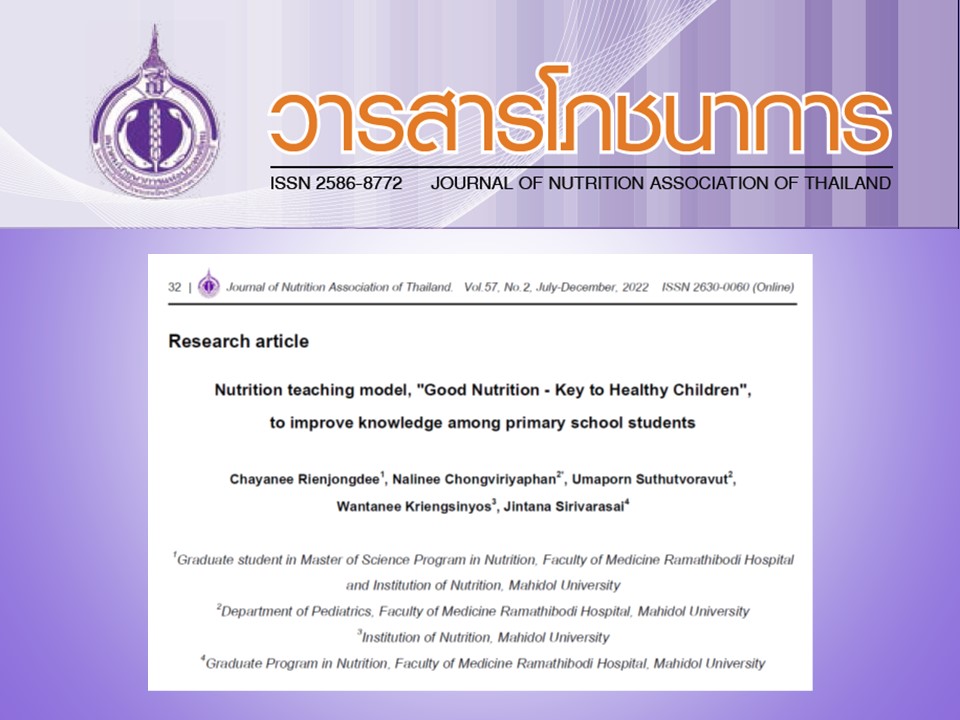Nutrition teaching model, "Good Nutrition - Key to Healthy Children", to improve knowledge among primary school students
Keywords:
nutrition, teaching model, primary school studentsAbstract
Thailand is experiencing double burden malnutrition. Improving nutrition knowledge in schools using a nutrition teaching model can potentially lead to healthier attitudes and behaviors among students. This study’s objective was to test the effectiveness of the nutrition teaching model "Good Nutrition – Key to Healthy Children" for Grade 3 students in improving their nutrition knowledge. Assigned teachers from 2 public schools in peri-urban areas of Bangkok were trained using printed teaching materials during school breaks. At the beginning of the semester, Grade 3 students took a knowledge pre-test before starting the first topic. Thereafter, the trained teachers conducted the nutrition lessons according to the nutrition teaching model. After the last topic (5 and 8 months after the first topic for School 1 and School 2, respectively), students took a knowledge post-test. Results showed that the mean knowledge scores of 283 students from both schools increased significantly compared to pre-test scores (14.32±3.51 vs 13.14±3.06; p<0.001). Students also had significantly higher mean scores in 4 out of 8 topics (p<0.01), which indicates improved student knowledge. This study’s results suggest advantages in using this nutrition teaching model to improve students' nutrition knowledge.
References
World Health Organization. Tenfold increase in childhood and adolescent obesity in four decades: new study by Imperial College London and WHO [document on the Internet]. 2017 [updated 2017 Oct 11; cited 2022 Dec 04]. Available from: https://www.who.int/news/item/11-10-2017-tenfold-increase-in-childhood-and-adolescent-obesity-in-four-decades-new-study-by-imperial-college-london-and-who
World Health Organization. Obesity and overweight [document on the Internet]. 2018 [updated 2021 Jun 9; cited 2022 Dec 04]. Available from: https://www.who.int/news-room/fact-sheets/detail/obesity-and-overweight
Department of Health, Thailand. Situation Report on Nutrition [document on the Internet]. 2015 [c cited 2022 Dec 04]. Available from: http://nutrition2.anamai.moph.go.th
Saritsiri S. Study surveying the nutritional status of students in Taweewattana District, Bangkok. J Publ Health. 2012;42(1):77-88.
Spronk I, Kullen C, Burdon C, O'Connor H. Relationship between nutrition knowledge and dietary intake. British Journal of Nutrition. Cambridge University Press; 2014; 111(10):1713–26.
Grosso G, Mistretta A, Turconi G, Cena H, Roggi C, Galvano F. Nutrition knowledge and other determinants of food intake and lifestyle habits in children and young adolescents living in a rural area of Sicily, South Italy. Publ Health Nutr. 2012;16(10):1827-36.
Lakshman R, Sharp J, Ong K, Forouhi G. A novel school-based intervention to improve nutrition knowledge in children: cluster randomized controlled trial. BMC Publ Health. 2010;10:123.
Kaewtes V, Lapvongwatana P, Vatanasomboon P. Effects of dietary and physical activity behaviors promotion program for overweight students in Bangkok metropolitan schools. J Publ Health. 2013;43(1):94-107.
Deelert E, Prajaknate P. Effects of innovative communication on the topic of overweight towards knowledge, attitude and practices of upper primary school students. NIDA Development Journal [serial online]. 2015 [cited 2022 Dec 04]. Available from: http://gscm.nida.ac.th/uploads/files/1598579964.pdf
Shah P, Misra A, Gupta N, Hazra DK, Gupta R, Seth P, et al. Improvement in nutrition-related knowledge and behavior of urban Asian Indian school children: findings from the ‘Medical education for children/adolescents for realistic prevention of obesity and diabetes and for healthy aging’ (MARG) intervention study. Br J Nutr. 2010;104:427-36.
Boonju W, Chulakarangka S, Uthaipatanacheep A. Nutrition education to encourage school children's behavior on Thai food consumption. J Community Dev Res. 2008;2(2):83-91.
Munoz Y, Cortes ME, Cortes AA. The use of interactive games enhances nutritional knowledge and healthy lifestyle among Chilean elementary school children. Adv Sci Lett. 2017;23(2): 819-2.

Downloads
Published
How to Cite
Issue
Section
License
Upon acceptance of an article, copyright is belonging to the Nutrition Association of Thailand.


